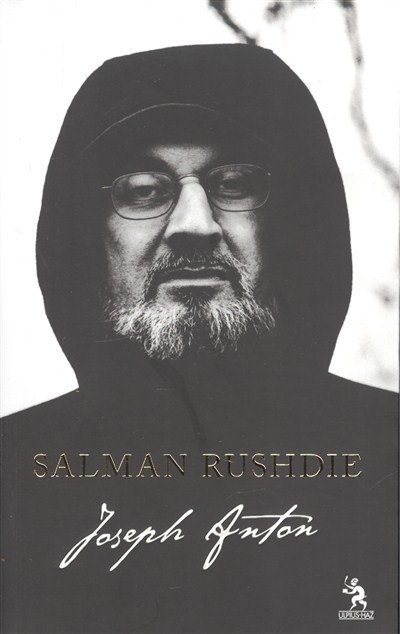Joseph Anton
- About Joseph Anton. NAMED ONE OF THE BEST BOOKS OF THE YEAR BY San Francisco Chronicle. Newsweek/The Daily Beast. The Seattle Times. The Economist. Kansas City Star. BookPage.
- Joseph Anton in the US. We found 71 records in 31 states for Joseph Anton in the US. The top state of residence is Florida, followed by California. The average Joseph Anton is around 64 years of age with around 30% falling in to the age group of 61-70. Search where Joseph Anton may live as well as their possible previous & current home addresses, cell phones, email addresses, background.
Joseph Anton: A Memoir is an autobiographical book by the British Indian writer, Salman Rushdie. It was published in September 2012 by Random House. Icom driver download for windows. Joseph Anton Aiello, Cambridge, Massachusetts. RPA Northeast Field Coordinator. All posts and opinions are mine. Fighting for a modern regional rail system in New England.
From Joseph Anton
Foundation President & CEO


Methodist Hospital builds on its historical relationship with the Methodist Church to improve the quality of life in South Philadelphia and surrounding communities by providing high quality services in a compassionate and caring manner. Since 1892, we have proudly served our community and remain committed to providing our patients with the very best care. We recognize and appreciate our employees, medical staff and volunteers for their dedicated service to Methodist Hospital throughout our history. We invite you to explore that storied history below and learn more about the incredible Women’s Association who have been our partner on the journey.
Learn more about Joseph Anton
Joseph Anton is currently the Vice President of Operations at Thomas Jefferson University Hospitals and is the site executive for the Jefferson Methodist Hospital campus. Joe is a results oriented, transformational healthcare leader who has led complex change initiatives across multi-hospital systems to achieve quantifiable improvements in efficiency, quality, and financial performance. He has extensive experience with service line leadership, operations, change management, and physician alignment.
In 2016, Joe was recognized by Drexel University in their “40 under 40” edition of their alumni magazine and in 2012, Joe was recognized by South Jersey Biz in its annual “20 under 40” edition recognizing leaders in various industries from across the region. Joe is an Adjunct Faculty member at Drexel University and teaches several graduate courses in their College of Nursing and Health Professions.
Joseph Anton A Memoir
Joe holds a bachelor’s degree from Villanova University, a master’s degree from Drexel University, and is a member of the American College of Healthcare Executives.
The Austrian composer Joseph Anton Bruckner (1824-1896) is best known for his nine monumental symphonies and his religious compositions.
Anton Bruckner was born on Sept. 4, 1824, at Ansfelden in Upper Austria. He was the first of 11 children of the village schoolmaster. At an early age Anton had his first music lessons from his father and began to help him with his teaching duties. When he was 11, he began to study with his cousin, and his earliest compositions date from this time. Two years later, at the death of his father, Anton was transferred to the monastery of St. Florian, where he remained as a chorister until 1840. St. Florian was always to be a spiritual refuge for him; at his own request, he was buried under the great organ there.
After preparatory courses at Linz, Bruckner was certified as an assistant teacher for elementary schools. He taught in a small village near Steyr, where he continued his organ studies. In 1845 he became a teacher and assistant organist at St. Florian and was finally appointed first organist in 1855. During the years at St. Florian, Bruckner composed many liturgical works. Typical of the larger-scale compositionsare the Requiem (1849) and the Missa solemnis (1854), both first performed at St. Florian.
In 1856 Bruckner became principal organist at Linz Cathedral. He studied with the Viennese theorist and organist Simon Sechter, traveling to Vienna every year for 6 weeks of concentrated study. During his 5 years of strict contrapuntal studies, he did not compose. Bruckner completed his course with Sechter in 1861 and began to study orchestration and form with the conductor Otto Kitzler. Through him, Bruckner came to know Wagner's music. Stimulated by this new experience, he began to write instrumental works: an overture, two unnumbered symphonies, and a string quartet.

Joseph Antonelli
Bruckner's first mature work was the Mass in D Minor (1864); it was followed by the Mass in E Minor and the First Symphony (1866). Partly because of overwork, the composer suffered a severe nervous breakdown in 1867. A sojourn at Bad Kreuzen brought him relief, and grateful for his recovery, he began his third, and last, great Mass, in F Minor, which he completed the following year.
Bruckner became professor of thorough bass, counterpoint, and organ at the Vienna Conservatory in 1868, a position he retained till 1891. He held other important posts in Vienna: organist of the Imperial Court Chapel (1868-1892) and lecturer in harmony and counterpoint at the University of Vienna (1875-1894). He also found time to write his huge symphonies, which are pervaded by a deep religious feeling. At first, they were not successful. His partisanship of Wagner brought him the enmity of Eduard Hanslick and other influential critics in Vienna, who preferred the music of Brahms. However, Bruckner's work gradually won recognition, especially outside Austria.
Joseph Antonio Cartagena
Bruckner's last eight symphonies were composed in Vienna beginning in 1871. He frequently revised his work; for example, there are three versions of the Second, Third, and Eighth Symphonies and four of the Fourth (Romantic) Symphony. Since other revisions were also made, with or without his authorization, by his disciples, it has been extremely hard to establish the accurate text of his symphonies. The International Bruckner Society has published critical editions.
Dr Joseph Anton
Bruckner's health failed during his last years. In 1895 the emperor Franz Josef offered him free quarters in the Belvedere Palace. There, after a morning spent working on the Ninth Symphony (the finale is incomplete), Bruckner died on Oct. 11, 1896.
Further Reading on Joseph Anton Bruckner
Two enthusiastic and sentimental biographies of Bruckner are Gabriel Engel, The Life of Anton Bruckner (1931), and Werner Wolff, Anton Bruckner: Rustic Genius (1942). Hans F. Redlich, Bruckner and Mahler (1955), is a well-balanced presentation of the two composers. Erwin Doernberg, The Life and Symphonies of Anton Bruckner (1960), is more opinionated. Robert Simpson, The Essence of Bruckner (1968), gives impressionistic analyses of the nine symphonies. Dika Newlin, Bruckner, Mahler, Schoenberg (1947), presents Bruckner in his cultural environment and includes analyses of his major works.
